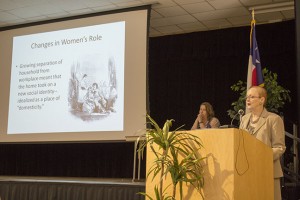By David Rojas/reporter
A panel of educators talked about the meaning of feminism to NE students March 25.
The panelists included NE history assistant professor Sara Reed, Texas Wesleyan University history professor Elizabeth Alexander and NE psychology assistant professor Jeanell Buck.
Reed discussed how feminism has received a negative connotation. She set the tone by presenting a video of actress Emma Watson giving a speech at the UN about gender equality and the campaign “He for She.”

Photo by Caitlyn Herron/The Collegian
Watson said feminism is more than women being unequal to men, but both genders are oppressed by certain stereotypes. Both men and women should feel free to be strong and sensitive, she said.
“It is time that we all perceive gender on a spectrum instead of two sets of opposing ideals,” Watson said.
Reed then introduced Alexander, who said three waves of feminism have existed since the early 19th century.
The first wave started with the Founding Fathers establishing what was acceptable for women and the roles they were expected to play.
Susan B. Anthony was one of the most notable women during the first wave because she tried to vote, which was illegal at the time, and was arrested.
The end of the first wave was linked to the passing of the 19th Amendment, which prohibits any citizen from being denied the right to vote on the basis of gender.
The second wave was during the 1960s when sexuality and reproduction were major issues focused on by women. More than before, women were protesting over these issues and myriad others.
Alexander said during this time, she tried to apply for a job as a bank manager, which she was qualified for.
“This bank does not hire women managers, but you can be a teller,” she was told.
The second wave ended with several laws being passed including the Civil Rights Act, the Women’s Educational Equity Act and the Pregnancy Discrimination Act.
In the third wave, females are stronger and more empowered than before. The third wave is still being defined, but women have made progress and are breaking boundaries.
Reed then introduced Buck, who focused on the social and psychological perspective. Buck said cultures and gender roles have been taught and learned over time, and these roles are influenced by families, media and institutions.
Buck mentioned that anger was a big difference between men and women, more often than not, men are far more aggressive than women and, therefore, more incarcerated.
Buck also focused on how girls as young as 3 years old are quickly defined by what they wear. There are far more clothing options for girls than there are for boys, she said.
She ended with a video called Miss Representation, which focused on how women have made great accomplishments, yet the media still only focus on their image.

























